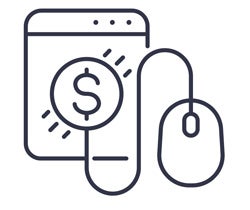 Centro said on Wednesday that it’s acquiring search engine marketing platform QuanticMind with plans to integrate the technology into its automated ad management platform called Basis.
Centro said on Wednesday that it’s acquiring search engine marketing platform QuanticMind with plans to integrate the technology into its automated ad management platform called Basis.
Although Shawn Riegsecker, Centro’s CEO and founder, declined to say how much Centro paid, he did share that QuanticMind reached $10 million in yearly revenue at its pinnacle and that the deal price is a multiple of that amount.
QuanticMind raised just over $30 million since 2015 when the company was founded as a search engine marketing platform.
But unlike other players in the SEM space, which are primarily workflow tools for keyword management, QuanticMind uses artificial intelligence and machine learning to connect and analyze the data that powers its optimization offering for paid search advertising and retail sites. QuanticMind can automatically adjust bids on numerous keywords.
“They’re able to handle tens of thousands of SKUs,” Riegsecker said.
And that’s something that was missing in Centro’s Basis ad management platform, which has its own DSP but no way to natively power search and social buying.
Riegsecker estimates that it’ll take a little over a year to integrate QuanticMind into Basis, at which point advertisers will be able to buy search, programmatic and direct from one interface within the platform.
“We’ll have our optimization algorithms powering the DSP and QuanticMind powering search,” Riegsecker said. “Then you don’t need people doing all of the optimization, because an algorithm can optimize budgets between channels.”
With that box checked, Centro will be well positioned to try and take a bite out of the growing retail media pie.
“We’re at this moment in the world where the way people search is changing – it’s not all starting on Google, it’s starting on Amazon or Walmart,” Riegsecker said. “That’s a huge opportunity for the PPC market.”
QuanticMind also brings along a customer data platform that’ll help enable ID resolution within Basis. Before the acquisition, QuanticMind had been planning to launch its own CDP later this year.
The CDP centralizes and connects conversion data with other offline data and makes it available so that advertisers can use that information to inform their buys, including keywords, social and programmatic.
“Stitching all of that together drives better performance than if you were working across separate platforms, which is an operational nightmare,” Riegsecker said. “Five years from now, I don’t think any standalone point solutions will even exist.”
QuanticMind has dozens of customers that use its SEM platform, including Rosetta Stone, Automattic, Home Advisor, Handy, Mutual of Omaha, Hot Topic and Windstar Cruises. Its 30 employees are joining Centro’s roughly 700 employees.
Centro had been pursuing QuanticMind for the last couple of years, but it was only last year when the conversations got serious. QuanticMind took a hit in 2020 due to COVID-19 and realized that to keep development going, it was either going to need to raise another round or get acquired. It chose the latter.














